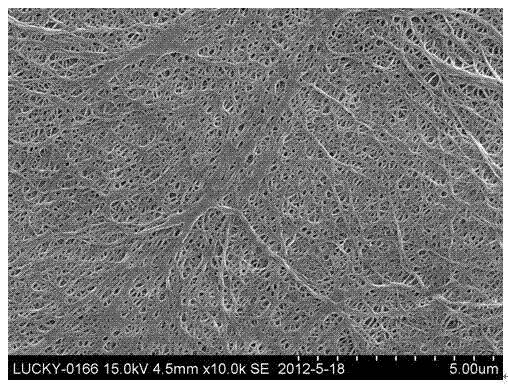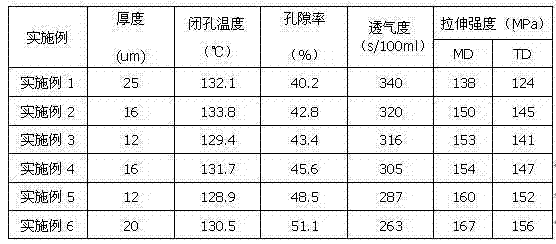Method for preparation of polyolefin microporous membrane by wet process
A technology of polyolefin microporous film and polyolefin resin, which is applied in the direction of flat products, applications, electrical components, etc., to achieve the effects of delaying thermal oxygen degradation, improving orientation degree, and reducing production costs
- Summary
- Abstract
- Description
- Claims
- Application Information
AI Technical Summary
Problems solved by technology
Method used
Image
Examples
Embodiment 1
[0041] (1) First, dissolve the antioxidant in liquid paraffin, and then inject it into the twin-screw extruder through different feed ports from the polyolefin resin. Among them, the mass ratio of antioxidant to polyolefin resin is 1:5000, and the mass ratio of polyolefin resin to liquid paraffin is 1:2;
[0042] The antioxidant in this embodiment adopts the hindered phenolic antioxidant β-(3,5-di-tert-butyl-4-hydroxyphenyl) n-octadecyl propionate, code 1076, polyolefin resin is viscous Polyethylene resin with an average molecular weight of 500,000, liquid paraffin has a viscosity grade of 45.
[0043] (2) In the extruder, the above-mentioned raw materials are melted and mixed into a uniform melt under the mixing, dispersion and shearing action of the twin screw. Among them, the gradient control temperature range is between 60 and 210°C.
[0044] (3) The melt is continuously extruded from the die, and rapidly cooled by a cooling roller to form a thick sheet. Among them, the temper...
Embodiment 2
[0050] (1) First, dissolve the antioxidant in liquid paraffin, and then inject it into the twin-screw extruder through different feed ports from the polyolefin resin. Among them, the mass ratio of antioxidant to polyolefin resin is 1:2000, and the mass ratio of polyolefin resin to liquid paraffin is 1:4.5;
[0051] The antioxidant used in this example is a phosphite antioxidant dioctadecyl pentaerythritol bisphosphite, code 618 or PEP-8T; the polyolefin resin is a polyethylene resin with a molecular weight of 1 million, liquid paraffin The viscosity grade is 70.
[0052] (2) In the extruder, the above-mentioned raw materials are melted and mixed into a uniform melt under the mixing, dispersion and shearing action of the twin screw. Among them, the gradient control temperature range is between 60 and 210°C.
[0053] (3) The melt is continuously extruded from the die, and rapidly cooled by a cooling roller to form a thick sheet. Among them, the temperature of the cooling roll is con...
Embodiment 3
[0058] (1) First, dissolve the antioxidant in liquid paraffin, and then inject it into the twin-screw extruder through different feed ports from the polyolefin resin. Among them, the mass ratio of antioxidant to polyolefin resin is 1:1000, and the mass ratio of polyolefin resin to liquid paraffin is 1:6;
[0059] The antioxidant used in this example is dilauryl thiodipropionate, code-named PS800 or DLTDP; polyolefin resin is a mixture of polyethylene resin with a molecular weight of 200,000 and 2 million in a ratio of 1:9, liquid The viscosity grade of paraffin wax is 75.
[0060] (2) In the extruder, the above-mentioned raw materials are melted and mixed into a uniform melt under the mixing, dispersion and shearing action of the twin screw. Among them, the gradient control temperature range is between 70-220℃.
[0061] (3) The melt is continuously extruded from the die, and rapidly cooled by a cooling roller to form a thick sheet. Among them, the temperature of the cooling roll i...
PUM
 Login to View More
Login to View More Abstract
Description
Claims
Application Information
 Login to View More
Login to View More - Generate Ideas
- Intellectual Property
- Life Sciences
- Materials
- Tech Scout
- Unparalleled Data Quality
- Higher Quality Content
- 60% Fewer Hallucinations
Browse by: Latest US Patents, China's latest patents, Technical Efficacy Thesaurus, Application Domain, Technology Topic, Popular Technical Reports.
© 2025 PatSnap. All rights reserved.Legal|Privacy policy|Modern Slavery Act Transparency Statement|Sitemap|About US| Contact US: help@patsnap.com


